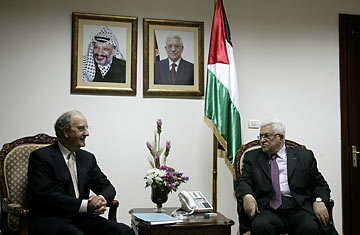
Palestinian Authority President Mahmoud Abbas, right, sits with Senator George Mitchell on Aug. 10, 2010
Even by the rough standards of Middle East diplomacy, Senator George Mitchell has received a beating during his tenure as President Obama's special envoy to the region. It took Mitchell 18 months of near constant shuttle diplomacy just to get the Israelis and Palestinians to sit down and talk face to face. In the process, Mitchell's effort has been labeled "an embarrassing flop" and a "failure" by editorialists and nonpartisan analysts. Obama himself admitted in January, "We overestimated our ability to persuade" the two parties "to start engaging in a meaningful conversation." That's hardly the kind of endorsement a mediator in chief wants from his boss.
Now that Israeli Prime Minister Benjamin Netanyahu and Palestinian Authority President Mahmoud Abbas have at last arrived in Washington to sit down for direct negotiations, starting on Wednesday with Obama at the White House, skeptics are declaring the talks doomed before they begin. But while it is always safest to bet against the Middle East peace process, Mitchell's critics might want to take another look at his performance, not least because it may say something about the chances for progress now that the two sides are talking.
The biggest knock on Mitchell is that he gambled and lost on a strategy to jump-start the peace process that relied on getting Netanyahu to halt all Israeli construction in occupied territories in exchange for Arab gestures toward normalization of ties with the Jewish state. The effort opened a deep divide between Washington and Jerusalem and stalled the peace process for months. However, during the Administration's internal debates, Mitchell opposed making a broad public U.S. demand on Israeli settlements. In a small group meeting with the President in June 2009, senior Administration officials told TIME last spring, Mitchell argued against chief of staff Rahm Emanuel's insistence on a tough line on settlements.
Mitchell lost that argument, and ultimately tried and failed to deliver on the Administration's hardball approach. Few in Israel believe he had a chance. Netanyahu's popularity among Israelis rose while Obama's fell in the fight over settlements, underlining the Administration's misreading of the Israeli political environment. If anything, Mitchell deserves credit for persevering in the face of an Administration miscalculation — and eventually overcoming it.
Another criticism of Mitchell is that he has been unwilling to impose a defined framework on this week's talks, leaving the Palestinians suspicious that the Israelis will drag them out indefinitely and American critics skeptical that the Administration will be able to force progress. In a press conference on Tuesday, Mitchell was vague about his approach to the talks, saying he had chosen, in his judgment, the best techniques from past efforts: frequent direct contact between Netanyahu and Abbas; "active and sustained" U.S. participation; leveraged international pressure on the players; and the creation of a positive atmosphere among the two parties.
Such generalities are not exactly inspiring, but there are some indications that behind the scenes, Mitchell has extracted more concrete commitments from Netanyahu and Abbas regarding the process and that those commitments are forming the basis of the talks. For example, Netanyahu has agreed to allow the Palestinians to reopen para-governmental institutions in East Jerusalem and take other confidence-building measures in the West Bank as the talks progress. Diplomats familiar with Mitchell's strategy say he has tried to craft a narrow, tight process focused on agreements between Netanyahu and Abbas, not underlings, and that he plans to chaperone those understandings with direct, high-level U.S. involvement.
That approach was conceived in hopes of avoiding the mistakes of the past. The Bush Administration failed in its first six years by refusing to engage in peace talks at all, leaving the two sides to make peace themselves — which they didn't. By contrast, Bill Clinton's explicit public guidelines for talks gave the opponents of peace political targets, exposing Arab and Israeli leaders to criticism before they could deliver results.
Still, as always in the Middle East, the safe money will bet against progress for the peace talks. Abbas is weak and has little control over the forces that stand ready to derail talks through violence — four Israelis were killed in an attack near a West Bank settlement on Tuesday. To his constituency, he has painted his reluctant participation in the talks as the result of "unbearable" pressure from the U.S. Netanyahu, meanwhile, has learned that withstanding U.S. pressure can make him more popular at home, decreasing Obama's ability to force concessions as the talks get tough.
Failure in the talks could be damaging for U.S. efforts in the region — and for Mitchell's reputation as a negotiator. The upside for Mitchell isn't great, either. Because of his insistence on high-level U.S. engagement, any progress that results will likely be attributed to the involvement of Secretary of State Hillary Clinton, who has indicated she's ready to weigh in, or of Obama himself. Even if things go well in the talks, Mitchell may, in fact, find it hard to get credit for the things he's done right over the past 18 months.
